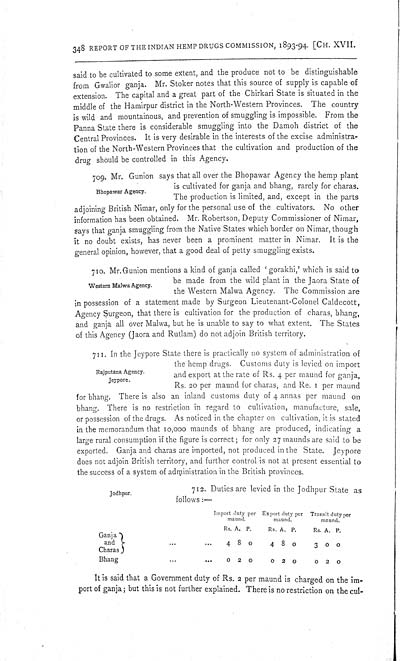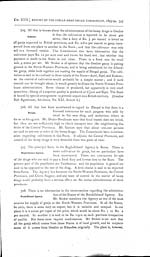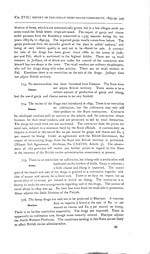Medicine - Drugs > Report of the Indian Hemp Drugs Commission, 1894-1895 > Volume I
(383) Page 348
Download files
Individual page:
Thumbnail gallery: Grid view | List view

348 REPORT OF THE INDIAN HEMP DRUGS COMMISSION, 1893-94. [CH. XVII.
said to be cultivated to
some extent, and the produce not to be distinguishable
from Gwalior ganja. Mr. Stoker notes that this source of supply is
capable of
extension. The capital and a great part of the Chirkari State is
situated in the
middle of the Hamirpur district in the North-Western Provinces. The
country
is wild and mountainous, and prevention of smuggling is impossible.
From the
Panna State there is considerable smuggling into the Damoh district
of the
Central Provinces. It is very desirable in the interests of the
excise administra-
tion of the North-Western Provinces that the cultivation and
production of the
drug should be controlled in this Agency.
Bhopawar Agency.
709. Mr. Gunion says that
all over the Bhopawar Agency the hemp plant
is cultivated for ganja and
bhang, rarely for charas.
The production is limited, and, except in the parts
adjoining British Nimar, only for the personal use of the
cultivators. No other
information has been obtained. Mr. Robertson, Deputy Commissioner
of Nimar,
says that ganja smuggling from the Native States which border on
Nimar, though
it no doubt exists, has never been a prominent matter in Nimar. It
is the
general opinion, however, that a good deal of petty smuggling
exists.
Western Malwa Agency.
710. Mr.Gunion mentions a
kind of ganja called 'gorakhi,' which is said to
be made from the wild plant
in the Jaora State of
the Western Malwa Agency. The Commission are
in possession of a statement made by Surgeon Lieutenant-Colonel
Caldecott,
Agency Surgeon, that there is cultivation for the production of
charas, bhang,
and ganja all over Malwa, but he is unable to say to what extent.
The States
of this Agency (Jaora and Rutlam) do not adjoin British
territory.
Rajputana Agency.
Jeypore.
711. In the Jeypore State
there is practically no system of administration of
the hemp drugs. Customs duty
is levied on import
and export at the rate of Rs. 4 per maund for ganja,
Rs. 20 per maund for charas, and Re. 1 per maund
for bhang. There is also an inland customs duty of 4 annas per
maund on
bhang. There is no restriction in regard to cultivation,
manufacture, sale,
or possession of the drugs. As noticed in the chapter on
cultivation, it is stated
in the memorandum that 10,000 maunds of bhang are produced,
indicating a
large rural consumption if the figure is correct; for only 27
maunds are said to be
exported. Ganja and charas are imported, not produced in the State.
Jeypore
does not adjoin British territory, and further control is not at
present essential to
the success of a system of administration in the British
provinces.
Jodhpur.
712. Duties are levied in
the Jodhpur State as
follows:—
|
Import duty
per |
Export duty
per |
Transit duty
per |
|
|
Rs. A. P. |
Rs. A. P. |
Rs. A. P. |
|
|
Ganja |
|||
|
and |
4 8 0 |
4 8 0 |
3 0 0 |
|
Charas |
|||
|
Bhang |
0 2 0 |
0 2 0 |
0 2 0 |
It is said that a
Government duty of Rs. 2 per maund is charged on the im-
port of ganja; but this is not further explained. There is no
restriction on the cul-
Set display mode to: Large image | Zoom image | Transcription
Images and transcriptions on this page, including medium image downloads, may be used under the Creative Commons Attribution 4.0 International Licence unless otherwise stated. ![]()
| India Papers > Medicine - Drugs > Report of the Indian Hemp Drugs Commission, 1894-1895 > Volume I > (383) Page 348 |
|---|
| Permanent URL | https://digital.nls.uk/74574832 |
|---|---|
| Description | Chapter XVII, cont. |
| Description | [Volume 1]: Report. |
|---|---|
| Attribution and copyright: |
|




